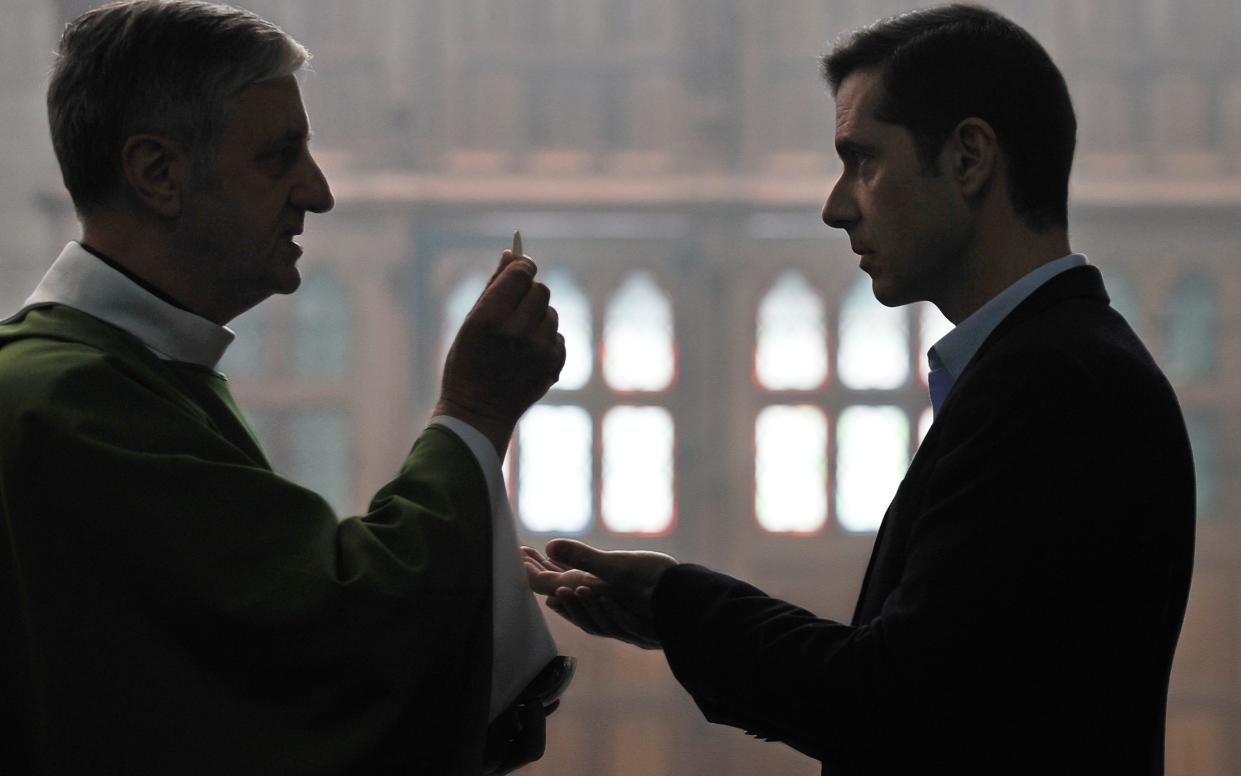By the Grace of God, review: the great cover-up of Catholic child abuse, laid bare in scalding detail

Dir: François Ozon. Cast: Melvil Poupaud, Denis Ménochet, Swann Arlaud, Éric Caravaca, François Marthouret, Bernard Verley, Josiane Balasko, Martine Erhel, Hélène Vincent, Frédéric Pierrot, Aurélia Petit. 15 cert, 138 min
It speaks to the range of France’s never-predictable François Ozon that he can follow up the kinkiest, silliest film he’s ever made – 2017’s crazed erotic thriller L’Amant double – with his most gut-wrenchingly serious. By the Grace of God is a scalding docudrama on a subject that has blazed its way with especial ferocity across the French media of late: the cover-up of child sex abuse by the Catholic Church.
If there were ever any doubt that Ozon, that impish provocateur, was the man to handle it, the career-topping urgency of his filmmaking sweeps it away inch by inch, sequence by methodical sequence. Without ever seeming unconsidered, this has a burning momentum that makes your heart pound.
One by one in its rigorous, fact-based account, the film brings together a group of men linked by a single hideous circumstance: they were all altar boys growing up in Lyon, and dozens of them – maybe as many as hundreds – were abused by a single priest, the now elderly Father Bernard Preynat (Bernard Verley).
The first victim we meet is a family man called Alexandre (the superb Melvil Poupaud, an Ozon regular), who has buried his memories of being serially assaulted until deep into adulthood, and managed to raise five children unquestioningly in the Roman Catholic faith.
He is driven, like many others, by seeing Père Preynat still at large – still teaching catechism to young boys, despite the warning flags that both Preynat himself, a self-confessed paedophile, and several families have waved at higher-ups over the years.
Alexandre contacts the Archdiocese in writing, wanting to be heard, and earns an interview with Preynat, mediated by a well-meaning Church psychologist (Martine Erhel). Horrifyingly, this takes the form of a roles-reversed confessional – with all the facts admitted, but nothing recorded, no repentance asked for and certainly none gained.
In stepping up his case when Church authorities stall, Alexandre is hobbled by the statute of limitations on criminal offences. Until French legal reforms as recently as 2017, this was a mere 20 years. How quickly were these boys, some eight or nine years old when they were raped, meant to set aside their terrified shame and come forward?
Alexandre’s own parents barely took him seriously when he raised the issue aged 17, and then decades later they accuse him of muck-raking – as does the father of the profoundly traumatised Emmanuel (a riveting Swann Arlaud). Or they’re accused of craven attention-seeking, as is François (Denis Menochet) by his bitter older brother. Only a more recent case, such as these two, might call Preynat to account under French justice, given that the Church won’t lift a finger.
Eventually, after trying to obstruct the film’s February release in France, Preynat was defrocked by a tribunal in July, and Lyon’s archbishop, Philippe Cardinal Barbarin (François Marthouret), offered his entirely appropriate resignation – which the Pope rejected. The film has caused necessary shockwaves, in other words.

But By the Grace of God isn’t a campaigning screed. These men meet hostility from staunch Catholics, many within their families, but the point is trenchantly made that their grass-roots activism isn’t against the Church but ultimately for it. Who would worship within an institution that wrings its hands, sweeping paedophilia under the carpet?
Ozon knits these complex, overlapping narratives into an enthralling tapestry of testimony, set to an organ-driven score by Evgueni and Sacha Galperine (Loveless) that gathers it up as a litany – something vital and long-awaited. For a relatively lengthy film, it’s fast, focused and unrelenting.
Boldest of all, Ozon doesn’t push some idea of monumental solidarity among the victims, but probes with brilliant subtlety at rifts and contradictions within the movement. It’s hard to imagine ever righting wrongs on this scale, but in the face of such jaw-dropping wilful blindness, there's something desperately human about the fight to be seen.

